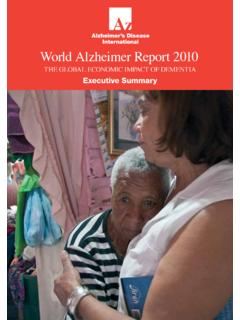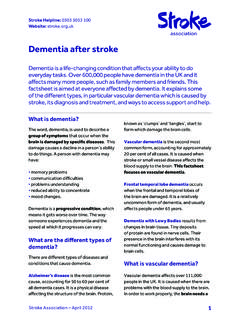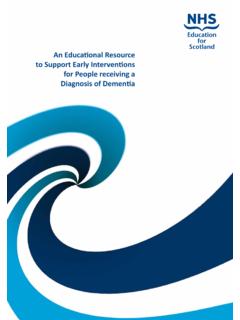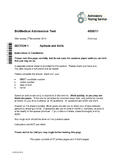Transcription of Pick's Disease by Dr - Association for Frontotemporal ...
1 Pick's Disease by Dr. Bob Fay Dr Bob Fay gave this talk on behalf of the UK alzheimer s Society at the Journal of dementia Care's Memory International Conference, held in London in 2003. It is reproduced here with full permission of the editor and publisher of the Journal of dementia Care, and may be freely photocopied and distributed for educational use. I have Pick's Disease , alias Frontotemporal dementia . Looking back I must have had it for about 10 years. The good news is that it is in my case very slowly progressive: the bad news is that I have it at all. Pick's is a sodder. It has changed me in subtle ways that outsiders find very difficult to understand, but are all too apparent to my wife and family, It has cut short my career as a General Practitioner; it has stopped me from driving; it has caused much grief and distress to my family. It has a name, but no known cause.
2 It has a very unpredictable course, and it has no treatment. It's a sodder, it's a sodder, it's a sodder. I am not seeking sympathy, but I hope that by conveying the truth about this Disease , from my point of view, from the inside, you may be enabled to understand it better. dementia has no dignity, no compensations: it continues day by day, year by year, to take and take and take, until death comes as a relief to all. The general public have no knowledge of unusual dementias whatever. That is understandable. Most people know of someone with alzheimer 's (AD), but unless that knowledge comes from close first hand experience, the knowledge is usually very superficial and straws of comfort are readily grasped: like the comforting belief that behind all the obvious confusion and muddle and failing physical health, the person inside is quite happy, and is unchanged in the inner person.
3 dementia brings anxiety, anger and grieving to the sufferer. It may be bravely born, but it is not fun; it is not an acceptable alternative lifestyle. Our experience has been that in fact some psychiatrists, geriatricians and neurologists are fairly ignorant of some of the rare young-onset dementias like Pick's , and if they have areas of ignorance in those conditions, then I suspect that most of the other health professionals who are involved with dementia sufferers, are similarly lacking in knowledge. That is quite understandable and I am not seeking to belittle, after all I was a GP only 8 years ago who was totally ignorant of any dementia that wasn't alzheimer 's. Incidentally what a very unfriendly word " dementia " is! Technically I must have been "dementing" for about 10 years. To me the term suggests INSANITY (and the dictionaries agree.) To be demented implies being frantic, overactive, out of one's mind.
4 I haven't settled on a better term, but I usually either say I have Pick's Disease or that I have a degenerative brain Disease . Sometimes I call myself "an old Dementonian" but then people think I'm claiming to have had an elitist education! I think the general public gets misled by the term dementia . Ginty, my wife, has reminded me of an incident at a party where she was talking to one of these infuriating women who can not only manage her family but also run a successful business and apparently neither succumb to stress or a bad hair day. Inevitably she asked "and what do you do?" When Ginty was forced into saying she was a carer, this lady replied" Oh, how awfully interesting. Who do you care for?" And when Ginty explained that she cared for the man over there who was her husband, and was driven to reveal that I had a Frontotemporal dementia , the woman replied "well, how extraordinary!
5 I've just been speaking to him and there doesn't seem to be anything the matter with him to me!" She had expected someone with dementia to be totally socially unpresentable, someone so far out of it as to need to be tidily put away out of sight. I do feel that somehow we need to find a less loaded term to cover these conditions which, medically speaking, involve dementia . It's so hard for people to realise that in the early stages one may have a very real handicap, but still seem normal. I'm not alone in finding that the most difficult feature of my condition is that people just can't see it. A recent AS newsletter gives the story of a lady 2 years into a vascular dementia . "I've been laughed at when I've said I have dementia ," she says. "People just don't believe me". When I was first diagnosed 6 years ago we were told that there were perhaps 600 cases of Pick's in the country.
6 I'm sure that number by now needs another nought on it. We know of 3 other cases within 10 miles of us in rural Somerset. I suspect that for every known case of Pick's there are several more undiagnosed cases. And it is terribly important to diagnose them because undiagnosed Pick's is lethal! It's a disaster waiting to happen. Someone with hidden Pick's is going to make an awful mess of things sooner or later. For a doctor with Pick's it means missing vital diagnoses or giving wrong drugs, or practicing "masterful inactivity" once too often; for a business man it means errors of judgement that may lead to financial ruin. We know of several cases where a once prosperous family has lost everything because the husband's judgement went down the pan, and no one would listen to the wife who just knew something was wrong. It is just so tragic to meet someone who once had a good income, a lovely house, and the prospect of a decent pension, but now literally wonders where the next meal is coming from, and finds that the pension has totally been swallowed up by the nursing home fees.
7 And all because by the time Pick's was diagnosed the husband had blown his business. Also: listen to and believe the spouse or carer. Frequently the spouse gets blamed "Dick's all right, the trouble is his wife is depressed". We know of a case where that situation went on for months and months. It should go without saying that the carer must be seen alone - well it should go without saying, but where my first diagnosis went wrong was because the Consultant literally turned his back on Ginty in the consultation and gave her no opportunity to speak to him alone. At times I can be fairly plausible, but if he had listened to Ginty he would have got the truth. There is just no room here for being PC and thinking it's immoral to speak behind the patient's back. It is in the patient's best interest and that's all there is to it. I'm going to give you a brief run-down of what the features of Pick's Disease are, just in case you know as little about it as I did when I was a GP.
8 The onset, unlike AD, is usually between 50 and 60. Men and women are said to be affected equally, though you wouldn't think so if you have anything to do with the support group. Here the carers all seem to be the wives of the sufferers, with very few husbands seeking support. We think this just reflects the different way men go about seeking help, or rather, not seeking help. There is a family history quite commonly, though not in my case. It's a Disease which affects the personality and social behaviour. Memory is affected but it's not the salient feature that it is in AD. So, considering the personality changes the sufferer may become more outgoing, or conversely - withdrawn. He may lose the ability to empathise with others becoming a cold fish, and being selfish and unfeeling. Aggressive behaviour may develop. He becomes less flexible, and will be irritated by being contradicted.
9 He may develop obsessive routines, or get over absorbed in one particular idea - what in my case I call "getting a bee in my bonnet". He may lose his inhibitions and become sexually inappropriate. In other ways he may become inappropriate, making tactless comments, joking at the wrong moment or being rude, and generally being an anxiety and embarrassment to his wife. Failure at work is often an early symptom, and is caused by the loss of the ability to make good decisions; also by the inability to notice changing circumstances, or, if he has actually noticed something has changed - he fails to act on it. So the businessman notices his junior is spending the company's money wildly, but does nothing. The doctor notices a significant lump, but takes no action. Failure at work is also caused by loss of concentration, or by loss of social skills. I can't see when I'm really irritating someone.
10 Another disastrous feature is that the sufferer may become a spendthrift. And finally, memory lapses will inevitably affect one's work performance. An important feature of the Disease is loss of driving skills. This seems to be brought about by a mixture of loss of judgment together with an inability to be aware of peripheral things when the attention is focused to the front. Speech problems are a feature, and in true Pick's Disease the sufferer may end up mute. An odd feature sometimes seen is overeating-simply stuffing one's face, and boozing. Other oddities are being unable to see things that are under one's nose; giving an opposite answer to that intended "coffee or tea?" and I say "tea" when I mean "coffee". Lack of drive is common. Needing more sleep, and falling asleep frequently during the day may be a feature. Increased sensitivity to pain or temperature may also occur.









